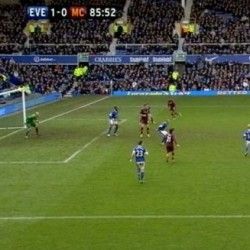
Video replays can't come quickly enough in the English Premier League
There were two incidents during this weekend’s Premier League fixtures that brought me to question something; why do we still not have any video replays to assist officials? Cricket, rugby, American football and tennis, to name a few, have all implemented video replays in some form to improve the quality and legitimacy of their sport. And yet, the English Premier League, the biggest league of the biggest sport in the world, is trapped in the stone age of human-error officiating. That is something the FA should be embarrassed about.
On Saturday, Marouane Fellaini got very lucky during Everton‘s 2-0 victory over Manchester City at Goodison Park. Whilst attempting to block a strike by City’s Carlos Tevez, the ball clearly struck Fellaini’s hand at least a yard or so into the box. Referee Lee Probert made a big mistake, deciding that the infringement was actually outside the box and awarded City a free kick instead of the deserved penalty. Perhaps Fellaini’s afro-style haircut restricted Probert’s view.
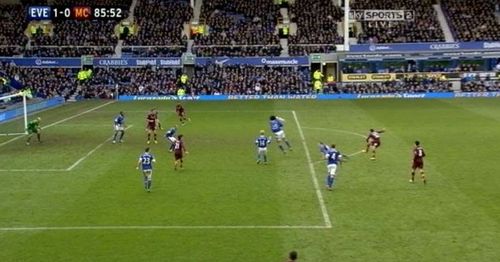
Video replays clearly showed that Fellaini’s handball took place inside the Everton 18 yard box.
The incident came when Everton were leading only 1-0, and had been reduced to ten men following Steven Pienaar’s earlier dismissal. There is little doubt that a penalty could have really changed the game for the Citizens, who were finding it difficult to create chances against a stellar Everton back line. After the game, Roberto Mancini was apparently “too angry” to talk to the media.
Then, on Sunday afternoon, Danny Rose handled the ball as he attempted to block a cross in Sunderland‘s 1-1 draw with Norwich. Again, referee Chris Foy awarded a free kick instead of a penalty despite replays clearly showing the infringement to have been inside the box. The decision potentially robbed ten-man Norwich of the opportunity to take home the 3 points.
There is no doubt that video replays would have ensured that both of these game-changing decisions were corrected.
It would be easy to implement too. All that would be needed is a simple system whereby an official, probably the 4th official, has access on the sideline to a television screen with a replay capability. He could use this to quickly view the replay of an incident and determine in a matter of seconds whether the right call had been made. The officials are all already connected via headsets, so quick communication of the decision wouldn’t be an issue. It could be operated similar to the video replay system used in the National Football League in USA.
A lot of the concern surrounding this kind of technology in football is centred on time. Specifically, how much time it would take to review the replay and come to a quick decision.
However, unlike in American Football where officials often have to look for the position of a ball concealed by several very large men, in football there are rarely any situations at all where it isn’t clear what the correct decision is. It took fans watching the Everton-Manchester City and Sunderland-Norwich games less than 10 seconds to be absolutely certain that both Fellaini and Danny Rose’s infringements were in the box. So coming to the decision wouldn’t take much time at all.
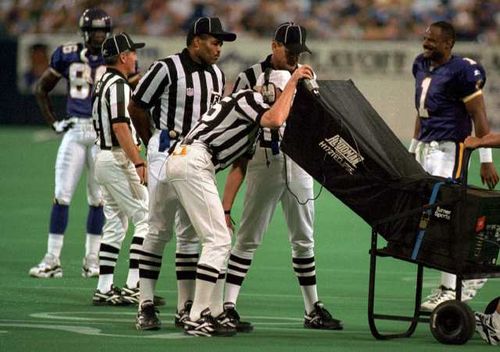
Officials gather to review a play during a National Football League game using the sideline review booth. Instant Replay has been implemented by the NFL in some form since the 1986 season, and has proved to be very successful
As I’ve already mentioned, the officials are all connected via headsets. So communicating the decision back to the referee would take as long as it takes to say “penalty” or “free kick”. No problems there.
Overall, the process would probably take about one minute. It isn’t going to hold up the game any longer than an overly fussy referee would. The amount of time some referees take while lecturing players after fouls, demanding that players walk all the way over to them before doing nothing more than saying “don’t do that again” while using their best headmaster impersonation, is probably longer than what a video replay review would take.
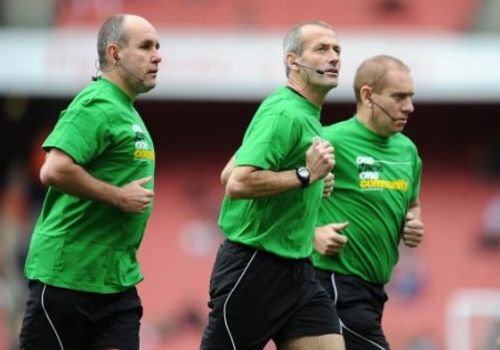
Match officials in England already use headsets to communicate during the match, including the 4th Official
Let me be clear on what I’m talking about here. I’m strictly advocating the use of video replays to determine whether a foul takes place inside or outside the box. I’m not talking about reviewing whether or not a foul actually took place at all. The decision to award the foul itself would not be under review; only whether it is a penalty or a free kick.
Used in this way, I can’t seem to think of any serious arguments against a video replay. Other uses of video technology, like awarding or disallowing a goal or reviewing an offside decision all have their own problems.
When do you stop the game and go to the replay if the goal isn’t awarded, for example? How long can a play have continued before you can no longer overturn it? Or who would make the final decision on whether or not a foul has taken place, if that were reviewed? How long would it all take? That is just a brief example of some of the legitimate concerns surrounding those ideas. None of them are relevant to video replays of fouls in and around the box, however.
One possible argument against video replays used on borderline penalty decisions would be that it just isn’t worth it. Rarely in a game do we see a free kick awarded right on the edge of the box, or a penalty given in the same circumstances. Why go to all the effort and expense when such a situation just doesn’t happen very often?
Well, firstly I’d say that it wouldn’t be too much trouble to install at all, and it wouldn’t be expensive. Essentially, you wouldn’t need much more than a TV and a couple of technicians to set up the equipment. Every EPL game is covered so extensively by sports channels that the FA wouldn’t even have to introduce their own cameras. They could just use the ones being used to broadcast the game. The 4th official could do the job of reviewing the film very easily, so there is no need to employ anyone else for the job. It would be very easy to install.
Secondly, I’d argue that decisions like this are worth spending that little extra on to make sure they’re correct. While they are rare, edge-of-the-box penalty decisions are too important to get wrong. The difference between a penalty or a free kick more often than not determines whether a team scores a goal (73% of penalties were converted in the 2011-2012 season). A single goal, just as in the case of the Everton and Sunderland games this weekend, could change the outcome of a match. The outcome of a single match will quite often dictate where a team finishes in the final standings. Just ask Bolton fans. The Trotters were relegated from the Premier League last season with 36 points. QPR finished one spot ahead of them, in 17th, with 37 points. That tells you how important every single point is in any given season.
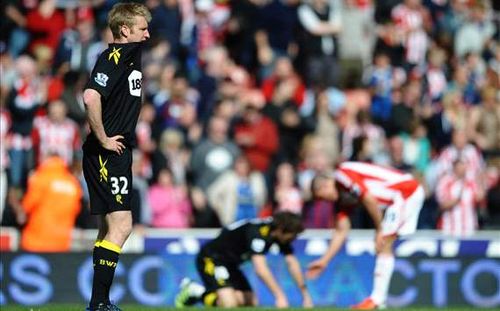
Bolton Wanderes were relegated in 2012 after finishing only 1 point behind Queens Park Rangers, showing just how crucial every single point in the Premier League is
Even if such a decision doesn’t affect whether or not a team is relegated, financially it is still very important for the club involved. The difference between places in the final standings amounts to something around £800,000. That kind of figure might be of no consequence to a team like Manchester City, but to teams without owners on the Forbes rich list, it could mean a lot of difference to their bottom line. It’s certainly not a negligible amount.
When every decision a referee makes can potentially cost a team either its place in the top flight of English Football or £800,000 in cash, isn’t it worth taking the time and money to make sure that as many of those decisions as possible are perfect? Technology and football are not great bedfellows, and the arguments for goal line technology and reviews of offside decisions are for another day. But right now, the FA needs to improve this simple aspect of the game. They should follow in the footsteps of almost every other televised sport in the world, and embrace video replays for the benefit and legitimacy of the game. When so much money is on the line every single weekend, it seems senseless not to.